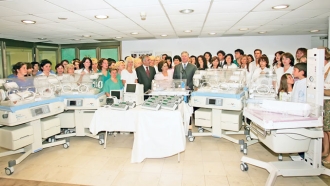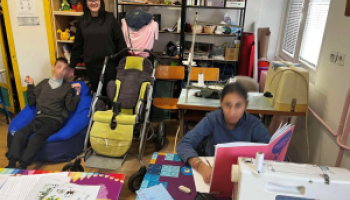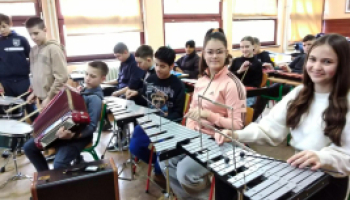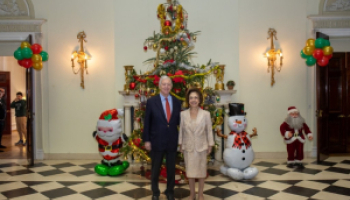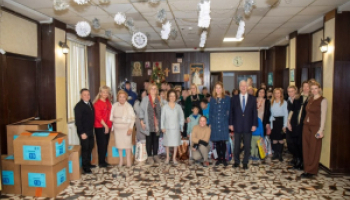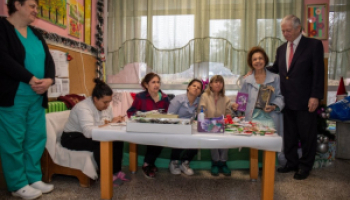- Home
- News & Events
- Interview with Princess Katherine Karadjordjevic in Politika Newspaper
Interview with Princess Katherine Karadjordjevic in Politika Newspaper
07 Jun 2022
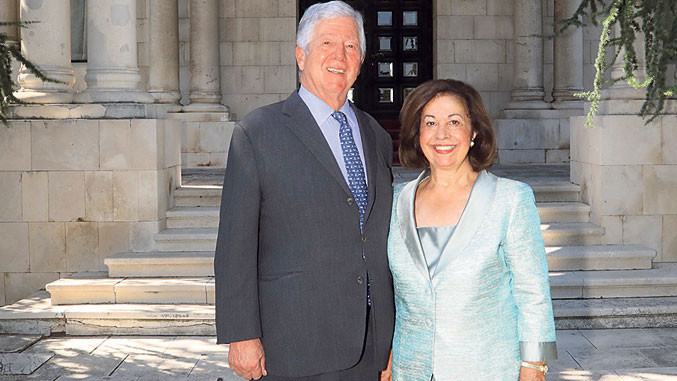
Politika, Saturday, 4 June 2022, Front page and page 8 Interview with Princess Katherine Karadjordjevic
We came to give, not to take
By Danijela Davidov Kesar
Princess Katherine Karadjordjevic has been helping the health care and social protection system in Serbia for almost three decades, and so far she has made possible that donations worth several million euros arrive to our country through over 250 projects. In an interview with "Politika", Princess Katherine points out that her desire to help everyone could not be realized without dear friends, donors with a big heart who have supported the dedicated work of the humanitarian organization "Lifeline", whose patron she is, for more than 25 years. "When the conflict in former Yugoslavia began, I felt the desire and will of the Serbian diaspora to help their compatriots,
so I opened the first Lifeline office in Chicago, and our friends from the diaspora immediately came to help with all their hearts. All the benefactors have done so much by helping the work of Lifeline's offices in Chicago, New York, Toronto, London and Athens, as well as the work of my Foundation in Belgrade, which was founded immediately after our arrival to Serbia in 2001. Only united are we strong enough to provide support and comfort. As the Serbian proverb I love very much says - "Only unity saves Serbs", Princess Katherine has emphasized.
How did you decide to engage in humanitarian work?
We came to Serbia to give, not to take and we were delighted to continue our work and our mission we were doing while living abroad. I was inspired and set on this life-long journey by my parents, who were great humanitarians and philanthropists in Greece. At my early age they taught me that there is no greatest joy in life than the joy of giving and I learned by their
own example. But I got even more inspiration when I met and married my husband Crown Prince Alexander. Seeing the great love which he has for his nation inspired me to focus humanitarian activities on the people we admire and respect, the same nation I fell in love immediately.
Even before you became the Crown Princess and wife of Crown Prince Alexander Karadjordjevic, you had a lot of humanitarian activities. Which were the most important?
Before there was a need to help Serbia, there were a lot of activities worldwide. I will mention this project of drilling wells in, at that time, Burma, today Myanmar, so the people can have a fresh water. I also have very fond memories of another project that Princess Irene of Greece and Denmark, sister of Queen Sofia of Spain, and I ran more than 30 years ago. It was done through humanitarian organization "World in Harmony". The main goal of this activity was to help children from poor families, with the desire to provide them with a stable source of milk, by sending a large number of dairy cows. I would find the cows in the United Kingdom, and organize the flights for them to be transported, and Princess Irene deliver them to families in India. This donation was of special significance because the cows are sacred animals for the believers of the Hindu religion, who use milk not only as a food product but also in religious rituals, and they do not kill them, so we knew it was a donation that would last and do good for many generations.
You made the first donation in Serbia 29 years ago. It was the sterile room for hematological patients at the University Children's Clinic in Tirsova?
Yes, it was in 1993, during the terrible and absurd war. Serbia was under international sanctions and embargo, against which I strongly rose my voice at that time, speaking to all permanent members of the United Nations. I was shocked by the fact that the aid was not distributed equally to all, but it was only being distributed to some. I remember showing photos of babies to UN members, and asking them “Can you tell from the photo what is the religion of these babies?” And many people contacted me, telling me they have the aid ready, but could not send it, due to application and administration problems.
At that time, my husband was still considered to be enemy of the state, we were living abroad and desperately wanted to help our people. It was not easy but we found the way to make the delivery of, as I said, isolation –
sterile room for hematology patients. It was done with great help and support of Prof. Dr. Ida Jovanovic, who is toady, together with other prominent and respected doctors and professors part of the Royal Medical Board, team of esteemed medicinal professionals, who have been supporting my work and giving me priceless advise, and to all of them I am very grateful. And I am very happy that this, and many other donations came to Serbia during the terrible war, regardless of the many obstacles and difficulties. As I like to say – when there is a will, there is a way.
You have given a lot of donations to this clinic. Is it true that you are especially emotional when it comes to this hospital because it was built by Queen Maria, your husband's grandmother?
Queen Maria was fascinating and strong woman, great humanitarian and prominent lady, who is a great inspiration for both my husband and me. Tirsova Clinic is one of the most famous endowments she left, but it is not the only one. People even today remember how much she has done for our country. I do not want to point out any of the health care institutions that we have been cooperating with during all these years, because it would not be right to have favorites. From the largest clinical centre to the smallest ambulance in the village at the end of some road, we do not make difference, all of them who need our help and support have got in and will receive it in the future as well. I need to say that, during our numerous travels all across Serbia, I have noticed that Serbs are very proud people, and do not like to say that they need help. I have to tell all of them – don’t be shy, but ask, tell what you need. Because if we do not know that you need help, how can we provide it.
One of your first projects in Serbia was to raise funds for the purchase of doors for the Temple of St. Sava. Is it true that King Peter II's great wish was for the construction of the temple to be completed as soon as possible, and that you wanted to help realize that great project first?
The building of this great temple was started under the high patronage of my husband’s father, King Peter II, and you are right, it was his wish that it is completed quickly. Unfortunately decades needed to past, so the building could be continued, and I am also very happy that my husband was the patron of the renewed Society for the building of the Saint Sava Temple, when it restarted its work in September 2001. It was our dear late Patriarch Pavle, one of the most kind persons we have ever met, who asked my
husband do we want to donate bells or doors. And my Alexander choose the doors, so anytime someone walks in, they remember us in a way.
And during the war in former Yugoslavia, you organized convoys with humanitarian aid?
War always hits innocent people the most. We did organize convoys of humanitarian aid to go to war inflicted areas, and I also on several occasions personally visited the Republic of Srpska to deliver the aid and to be with our people, so they know there are people who care for them and want to help them. Many trucks from United Kingdom were part of these convoys, and “Virgin airlines” company helped me tremendously transporting medical equipment from USA. I even remember delivering candle making machine to the hospital, so they could have light without electricity.
The devices you donated to health institutions saved many lives. How hard is it for you when you hear what problems patients are encountering?
It is hard for me to hear it, I get very emotional, but I am very glad they are sharing their problems with me, and I do not let it disturb me, but it pushes me to work even harder. I will always remember the lady who came to the Palace for a tour numerous times hoping to run into me and my husband. When she finally met me she told me “I came here several times hoping I will meet you”. When I asked her why she did it she said: ”I was very sick and was told that I will not survive. Days after I heard that, a new machine was delivered by your Foundation to the hospital, and it saved my life.” We both started crying. That makes it all worthwhile.
You pay special attention to the prevention of breast cancer?
Lifeline offices abroad and my foundation in Belgrade had a lot of activities on the field of prevention of breast cancer, since according to the official WHO statistics, it is the most common malignant tumor in the female population in the world. We have all been actively involved in raising awareness of the importance of preventing, treating, and fighting breast cancer, as well as providing medical equipment to identify and treat the disease in time. Five oncology symposiums, dedicated to screening and treatment of breast cancer and other most frequent cancers, were organized
in Belgrade in collaboration with professor Hedvig Hricak and her team from the Memorial Sloan Kettering Cancer Center in New York.
In addition to the donation of the digital mobile mammography unit to the Clinical Center Nis, which was done with the great support of the Stavros Niarchos Foundation in 2010, on which over 150,000 preventive examinations have been performed so far, the generous donors of Lifeline and Foundation in Belgrade also helped with a donation of a workstation for digital mammography. Also, new medical equipment and reagents used for genetic testing of hereditary predisposition for breast and ovarian cancer were donated to the Institute of Oncology and Radiology of Serbia.
You had a lot of humanitarian activities for the Republic of Srpska?
We never divide our people, for us Drina River is not a border. Only in the past year we have done several projects. Tradition that my husband and I renewed after our arrival to Serbia, is giving presents for the children without parental care, with difficulties in development and economically deprived children etc. for Christmas and Easter, and that is made possible thanks to the benefactors of Lifeline Chicago. And children from Republic of Srpska are always included. I remember how, when they first came some of the kids looked disappointed. I asked them – What is wrong children, why are you sad? They said – But we thought you will be wearing the Crown, where is your Crown Princess? And I replied to them - My Crown is in my heart. Without love we have nothing. And you are all in my heart. We never forget our people who are in unimaginable difficult conditions living in Kosovo and Metohija.
In the field of education and social care, you paid a lot of attention to kindergartens and schools in Serbia?
Besides schools and kindergartens, over the years we have visited many orphanages and homes for children. We always carry them gifts with shoes and clothes, for which we in advance check with the management the size, so each child receives a personal, their own present. We have also started a SOS Child line, which is a project I am very proud of, where children who have problems can have somebody to address to openly. Also, there is a Lifeline project called “Children helping children”, where we encourage the youngest to help the children who are less fortunate.
Doctors are exchanging knowledge
For 12 years, your Foundation has been organizing the Conference of the Serbian Medical Diaspora. How significant is that?
This traditional conference, that will be organized for the 12th time this year from 16 to 18 June, is very important. It brings together several hundred the most eminent domestic and international experts to create and improve professional relations, but also friendships. We have only one goal: to help Serbia and its citizens, by exchanging valuable knowledge and experiences, but also to share the great knowledge of Serbian doctors with the world. This year it will be combination of online and live conference, so even if participants cannot physically be in Serbia, they will be able to follow the lectures over internet. All the interested doctors can join us through the website of the conference - https://serbiandiasporamedical.rs/wp/
Supporting the fight against Covid
During the Covid 19 pandemic, you haveaccomplished several significant projects?
Lifeline offices and the Foundation in Belgrade raised donations for hospitals across Serbia and the Republic of Srpska, to help doctors and nurses, who are the true heroes of our times. When the outbreak of pandemics occurred, we together managed to provide the hospitals with necessary equipment, medical supplies, and protective surgical face masks and gloves. From the very beginning of the pandemic I also managed to connect the Clinical Centre of Serbia with the well-known Mayo Clinic in the United States, so Serbian doctors, especially those who were main for the fight against pandemics, and doctors from Mayo Clinic were able to exchange knowledge and experience on COVID-19. In the beginning of the pandemic we also got a request from the Clinical Centre of Serbia to provide rooms for the doctors to be next to the Hospital. Arrangement was made with Tesla Hotel, that is located across from the Clinical Centre, and the hotel was closed at the time, to open on the same day and to provide accommodation for 30 doctors, so they can be available 24 per hours day for their COVID-19 patients. We also arranged food to be delivered to doctors in the hospitals, as well as the computers for the hospitals, so they could much more efficiently process and store important data. We continue doing that in the second year of pandemic.


